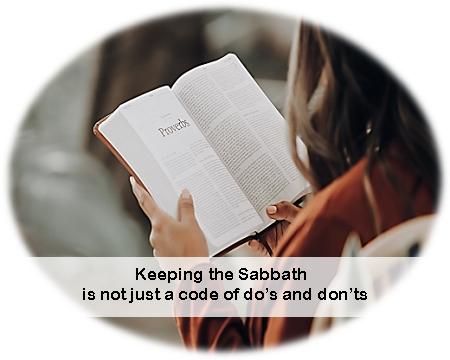Keeping the Sabbath An Aid to Worship
Keeping the Sabbath An Aid to Worship

Keeping the Sabbath is foreign to most Christians today whether they are Reformed or dispensational. Opinions differ both in terms of its legitimate relevance for Christians and regarding its specific practices if relevant. The bottom line is that keeping the Sabbath is a requirement of God’s moral law and as such Christians should endeavor to keep the law – not in order to gain divine favor or salvation (that would be legalism), but because they have received divine grace (that would be sanctification). Those in Christ are free from the law as a means of life, but they are not free from the law as a way of life. Grace always puts the law in its proper place, and this certainly applies to the practice of worship. If we are to worship in the beauty of holiness, we must worship according to what God defines as holiness. Grace gives us the desire and the ability to do it. Nothing is more “anti-grace” than disregarding God’s law.
This fourth commandment, recorded on stone in Exodus 20 and expounded by Moses in Deuteronomy 5, requires the keeping of the Sabbath. The inspired inscription of Exodus together with the inspired interpretation and application of Deuteronomy give clear direction for using the Sabbath as an aid to worship.
Definition of Terms⤒🔗
A proper definition of terms is crucial to any discussion, and this is certainly the case for any discussion of the Sabbath since so much of the misunderstanding stems from improper definitions. Let’s start at the beginning. The verb “remember” in the Exodus statement suggests awareness of the Sabbath prior to Sinai as is illustrated from the narrative in Exodus 16, where the Lord sets down the rules for gathering manna. Remembering does denote a mental recall, but it involves much more. Too often remembering and its counterpart forgetting are mental operations over which we have little control. It is a common human malady to forget what we should remember and to remember what we would like to forget. But the Hebrew terms for these mental maneuvers express willful, voluntary acts rather than uncontrollable, involuntary processes. In other words, to remember is to think about something on purpose; to forget is to refuse to think about something on purpose. Consequently, the Exodus statement requires conscious reflection and equates to Deuteronomy’s command to keep or observe the Sabbath day, which in turn requires attentive and careful obedience.
Perhaps the biggest misconception involving the fourth commandment concerns the meaning of the term “Sabbath,” which is basically a transliteration of the Hebrew term. In spite of the association of the word in this context with the seventh day, the term does not inherently refer to the seventh day nor does it have any connection to the number seven at all. The Sabbath designates the seventh day of the week only when the context specifies it as the seventh day. The word comes from a verbal root meaning “to cease.” Simply, the Sabbath is a day that stops or a day that marks or sets a limit. It is a day of cessation, regardless of what day of the week it is. In fact, in the Old Testament’s calendar, there were any number of days designated Sabbath that would not have fallen on the last day of the week. The undeniable fact that the term Sabbath does not uniquely designate the seventh day of the week ought to remove any objections to referring to the first day of the week as the Christian Sabbath. It is crucial to note that the law’s imperative required keeping the Sabbath day holy without specifying what that day was. The principle was that one day in seven was to be a Sabbath day, a day of rest. Inherent in the statement was a built-in provision for a dispensational shift of days but not for a dispensational subtraction from the Ten Commandments.

The infinitive expression “to keep it holy” or “to sanctify it” (the Hebrew text is the same in both Exodus and Deuteronomy) explains what remembering or keeping the Sabbath entails. This infinitive – the factitive form of the verb “to be holy,” which is grammatical jargon for putting something in a given state or condition – means simply that the Sabbath day is to be put into a state of holiness. Since the basic idea of holiness is separation, the idea is that the Sabbath must be made separate or distinct. Sanctifying the Sabbath requires setting it apart, making it different from all the other days of the week. Clear enough!
Logic of the Sabbath←⤒🔗
If the Exodus and Deuteronomy passages are considered together, there are two significant and related reasons why the Sabbath is required. According to Exodus, the Sabbath day is to be free from all labor because of the example God established at creation: He rested. God rested, and we must rest as well in imitation of Him. His holiness is the perfect standard of ours; we must be holy because He is holy. Imitating His rest is tantamount to experiencing His presence. Throughout the Scriptures, the Sabbath principle is a key component of a theology of rest. Theologically or spiritually, to be in the place of rest is to be where God is. Being in the presence of God is an objective in worship, and remembering the Sabbath helps to accomplish that objective. According to Deuteronomy, the Sabbath is to be observed because God delivered His people from bondage. Resting in His presence and remembering His grace go hand in hand. Relief from the mundane affairs of life allows time for proper reflection and worship of the Lord for who He is and what He has done. It takes time and a proper frame of mind to worship, and the Sabbath provides for both.
This is good logic. A scriptural keeping of the Sabbath is a means of shelving legitimate but mundane concerns and blocking out distractions that compete with spiritual matters for attention. The Christian must set himself apart from the labors and happenings of everyday existence in order to worship the Lord effectively. By setting aside those things that are lawful and necessary on other days and making it the delight of the heart to spend time in public and private worship and in performing works of necessity and mercy with a true heart, the Christian will enjoy God and find the necessary impetus to serve Him with fervent zeal. Suffice it to say that God deserves constant worship and praise. However, in His providence, He has given us other things to do that demand our time and attention. He has given us six days to accomplish all that we must legitimately accomplish. In His law, He has set aside a time when we can and must give our full attention to Him. Without such a day, that kind of worship is impossible, but He has set aside a time when giving full time and full attention to Him is possible. That is a demonstration of His goodness to us to aid us both in our work and our worship. I like the way one theologian summed it when he called the Sabbath “a gift of Divine grace for the sanctification of the people.” And it is even better to put it in the words of Christ – “The Sabbath was made for man” (Mark 2:27).
Even apart from the biblical mandate for keeping the Sabbath, it just plain makes sense. Worship takes time and requires attentive concentration, both of which the Sabbath facilitates. Too often Christians enter the sanctuary with a million things on their mind; it is not surprising, therefore, that so many churches today experience shallow worship. By setting aside the ordinary business of life, it is possible to enjoy a frame of mind that allows unhindered thoughts of God. Keeping the Sabbath is not just a code of do’s and don’ts; it must be a spiritual issue, a matter of the heart. Isaiah 58:13-14 sums up the way to observe the Sabbath: it is a day to be observed with a spirit of self-denunciation, a spirit of devotion, and a spirit of joy. The Sabbath is not a dull day to get through; it will not be a holy day unless it is a happy day. It is God’s gift to us.

Add new comment